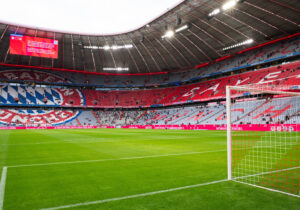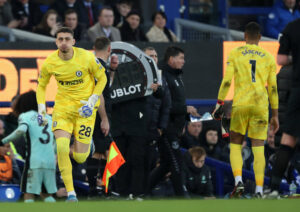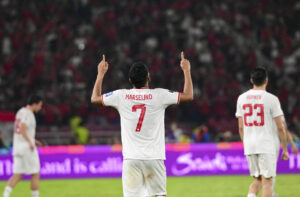Several British players have tried their luck on the continent throughout the years, with varying degrees of success. Whatever their situation, however, few can claim to have a story quite like that of Scottish midfielder Paul Lambert. The story of how he went from an almost unheard of player, to a vital cog in a team that conquered Europe still sounds quite unbelievable.
Lambert is familiar to many of today’s fans for his managerial roles at Norwich City and Aston Villa, among others. His role in Borussia Dortmund winning the Champions League in 1997, however, was one of the most vital, yet understated, in the competition’s history.
Early Beginnings
Paul Lambert was born in Glasgow in 1969, but seemingly slipped under the radar of Old Firm rivals Rangers and Celtic. He began his professional career at St Mirren, and made his debut at the age of 16 in the 1985-86 season. The following campaign saw him become a regular, playing 37 times in all competitions. A box-to-box midfielder with a great engine, despite being only a teenager he soon became one of the first names on the team sheet.
Lambert ended his first full season with a Scottish Cup winner’s medal, as his side beat Dundee United 1-0, who were also UEFA Cup finalists that year. This was actually the last time the competition was won with a side comprising of eleven Scottish players.
During Lambert’s years at St Mirren, the club usually found themselves in a relegation battle, never finishing higher than 7th. Had it not been for the expansion of the Scottish Premier Division in 1991, when the club finished bottom, they would have been relegated a year earlier. In 1992, finishing 11th in the now twelve team division, they finally lost that fight. Lambert stayed to try and help his team back to the top flight, but St. Mirren finished fourth. In September 1993, the midfielder transferred to Motherwell in a £250,000 transfer.
Motherwell
Motherwell had finished in eighth position in the Scottish Premier Division in 1992-93, and nobody predicted much of a change for the club the following season. What transpired was that the Fir Park club put up a surprise challenge for the title. They eventually finished in third place, just four points behind champions Rangers. This was enough to see them qualify for the following season’s UEFA Cup. This was where the seeds for Lamberts eventual European exploits were really sown.
Having dispatched of Havnar Boltfelag from the Faroe Islands in the preliminary round, they were then matched with German giants Borussia Dortmund. Facing World Cup winners such as Andreas Möller and Karl-Heinz Reidle must have been a daunting task, but the Scottish side acquitted themselves well. At the Westfalenstadion they lost by a solitary goal, but what had really caught manager Ottmar Hitzfeld’s eye was Lambert’s energetic performance in midfield. It was reportedly something he never forgot. After Dortmund finished the tie by winning 2-0 in Scotland, Motherwell focused on the league. Although they went one better by finishing second, this time they were 15 points behind Rangers.
The 1995-96 season would be Lambert’s last at Fir Park, and one in which Motherwell finished in eighth position. As the division had now been restored to ten teams, it meant they finished just above the drop zone. Although a contract extension was on the table, Paul Lambert decided that he wanted to try his hand abroad.
The Bosman ruling now meant that he was free to move wherever he wished under freedom of contract. He promptly got in contact with a Dutch agency to see which clubs would offer him a trial. PSV Eindhoven were interested, as were Borussia Dortmund. First he tried PSV, where he was played in an unfamiliar position on the right of midfield. So he drove to Lübeck, where Dortmund were playing in a pre-season tournament. On the back of his performances, he was offered a contract.
Dortmund
In the summer of 1996, the first high profile Bosman transfer was that of Edgar Davids from Ajax to AC Milan. When Paul Lambert passed his trial at Borussia Dortmund and signed with the German champions, it barely made a headline anywhere, even in Scotland. Dortmund fans were more excited at the acquisition of Portuguese midfielder Paulo Sousa, who had just won the Champions League with Juventus.
One of the first things that Hitzfeld did, having noticed his qualities when playing against him, was to convert Lambert into a holding midfielder. This disciplined role took advantage of the Scotsman’s fitness and ability to read the game. It also allowed the more attacking midfielders, such as Sousa and Möller, the freedom to express their talents.
Although Dortmund relinquished their title to Bayern Munich, their European campaign more than made up for it. Although this was a much higher level than Lambert had previously played at, he was not overawed by it at all. If anything, he seemed to relish it, even scoring against Widzew Łódź in the group stage.
By the time Dortmund qualified for the knockout rounds, Lambert had established himself as a key player in the side. Prior to moving to Germany, he had only featured for Scotland twice and was not in the squad for Euro ’96. His performances in the Bundesliga and the Champions League meant that manager Craig Brown suddenly began to take notice. He made Lambert a regular in the side, and would eventually captain his country on numerous occasions.
After easily dispatching of French side Auxerre in the quarter-finals, Dortmund were not fancied to get past Manchester United. Lambert’s role in a 2-0 aggregate victory was as important as the goals that won them the tie. United captain Roy Keane later remarked in his autobiography just how impressed he had been with the Scottish midfielder.
A Midfield Masterclass
Looking back at the 1997 Champions League final could be used to teach up and coming young midfielders. At this point Zinedine Zidane was judged by many to be the best midfielder in the world, and he was only just approaching his peak years. Paul Lambert marked him out of the game completely, meaning Zidane barely got a sniff of an opportunity to showcase his talents.
In spite of his defensive duties, the discipline Lambert showed in the role meant that he knew exactly when he should venture forward. He showed this by setting up the first goal of the night. His cross was chested down by Karl-Heinz Reidle before powering the ball past Peruzzi. When the striker added a second a few minutes later, it was an uphill struggle for the Turin giants.
Although Juventus did pull one back, they were still struggling to create clear openings. One of the main reasons for this was that Zidane was really struggling to impose himself on the match. Wherever he went, Lambert followed him, which is probably something that neither he, or his manager Marcello Lippi, expected. When Lars Ricken hit a majestic chip over Peruzzi for Dortmund’s third, there was no going back for Juventus.
In lifting the Champions League, Lambert became the first British player to do so with a non-UK club. The likes of Kevin Keegan and Laurie Cunnigham had reached the final, with Hamburg and Real Madrid respectively, but fell at the last hurdle. It was something that, even in his wildest dreams, he could not have imagined doing when his time at Motherwell came to a close less than a year earlier.
Auf Wiedersehen Dortmund
In spite of how much of a success his time at Dortmund had been, Lambert’s stay at the Westfalenstadion came to an end after just fifteen months. In November 1997, Celtic bid £2 million for his services, and this was accepted. It was quite a surprise considering how vital a part he had played in their European triumph. Despite Nevio Scala taking over as manager, Lambert had not struggled for playing time, having made twenty appearances already that season.
His final appearance for the club was in a Champions League group stage game against Parma, when the news was announced to Dortmund’s fans. He was given a hero’s reception by the crowd, who had always appreciated the selfless job he had done for the team. The feeling was clearly mutual, with Lambert having prepared a banner thanking the fans for their support.
Later Career
Lambert returned to his native Scotland and became a key player in Celtic’s resurgence over the following years. 1998 saw the club win their first league title in ten years. If that wasn’t sweet enough for the Parkhead club, it stopped Rangers winning what would have been a record ten titles in a row. Just for good measure, they also won the Scottish League Cup as well.
When Martin O’Neill took over at Celtic, Lambert won a further three titles, two Scottish Cups and another League Cup playing for the Bhoys. He almost completed his collection of European trophies, with Celtic losing the 2003 UEFA Cup final to Porto. Lambert was captain of the club by this point.
In the summer of 2005 Lambert became player-manager of Livingston, but it was to be a short-lived venture. With the club rooted to the bottom of the Scottish Premier League, and eventually relegated, Lambert resigned in February 2006.
After retiring as a player Lambert went onto manage Wycombe Wanderers and Colchester United before his most successful managerial stint to date; Norwich City. He led the Canaries to the Premier League following two successive promotions. He later had spells at Aston Villa and Blackburn Rovers, and is currently the manager of Wolverhampton Wanderers.
British Players Abroad: Paul Lambert
When British players move abroad, it is not always a success. What was amazing about the journey of Paul Lambert was that he achieved so much in a short space of time. When he moved to Dortmund, few outside of Scotland had even heard of him. After the 1997 Champions League final, it’s fair to say his profile was raised more than a little.
Lambert admits that it was a hard decision to leave Dortmund, and the only time that football made him cry. He had learned the language, and settled very well in the city. The prospect of returning to Glasgow was one too tempting to resist. It proved a good decision for both parties, as both club and player enjoyed many trophy-laden years as a result.
The story of Paul Lambert, and the success he enjoyed at Dortmund is one of the most unusual in modern football history. A journeyman player who took a risk, which paid off in the best way possible, winning club football’s biggest trophy.
To read the previous articles in this series, click below:
1 – Gary Lineker 2 – Ian Rush 3 – David Platt
4 – Mark Hughes
Main Photo






